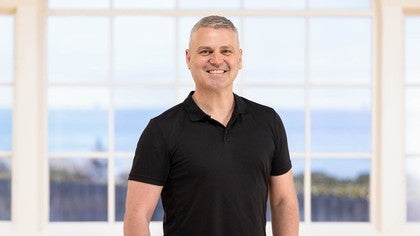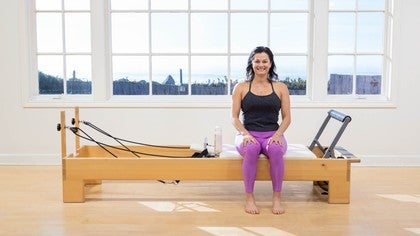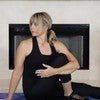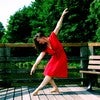Description
About This Video
Transcript
Read Full Transcript
Hi. I'm Lesley Logan, and I wanna chat with you today about maybe you're feeling a little bit of imposter syndrome, maybe a lack of confidence, maybe you're just feeling like you're new, and you should be further along. And I first wanted to say it's absolutely okay to be where you are. I remember when I first started teaching, having so much emposer syndrome and wondering, like, why didn't figure this out faster? Why did I become a teacher sooner? I was comparing myself to other people around me and their journey. And that caused me to also wonder, well, I went on a dancer.
So maybe people won't take me seriously because I didn't come to this as a dancer. And I just want to say it one more time, like, being where you are is absolutely okay. And how you got into teaching is an incredible journey that is going to attract the most amazing clients that only you can teach. So if you're feeling a little bit of imposter syndrome around some of these areas, I hope my advice is about to help you in a big way. If you're comparing yourself to other people, that is a sure, a shared track and journey for you to feel impostors in You are not exactly where they are ever.
Even if you started with someone at the exact same time in the same class and then you got to the same training program and you start the same studio, what brought you into teaching is very different. And so focus on exactly why you've gotten to teaching, what made you excited to bring this method to people in their lives and how you want to change their lives. And also who that's for. If you can stick with that and not compare yourself others. Instead, what you'll find so having imposter syndrome is inspiration from all these people and realizing that there are so many different ways that we can teach people. If you're new and you're feeling imposter syndrome, that's what they say.
You're supposed to. It's definition of an imposter. You're You don't know how to do something yet. So allow yourself to be new. Allow yourself to be a beginner and allow yourself to to focus on finding clients who are also new.
And teaching them the best new session, the best beginner session, the best first sessions, have fun building their foundations, and being on their journey. And together, you guys are going grow. If you are not doing as much poise as you've used to, that is actually going to cause imposter syndrome. When we first get into doing Pwise, we do it a lot. Like, it's it's a sure sign you want to be a teacher when you start going every single Right? You can't get enough of it. That was my journey.
I went every single day. I couldn't stop. In fact, I became a teacher mostly to supplement my love of Pilates. And then what I saw is all of a sudden you start teaching. And you wanna teach because you want this to be your job. You want this to be the way that you make money. And that means you actually stop doing as much pilates.
And all of a sudden, your practice went from every single day or even a few times a week to one time a week or no times in a week. That is going to bring on a lack of confidence or a or an imposter syndrome feeling because you are not doing what you actually love the most, what brought you into this. And you're telling people to come multiple times a week, and you yourself are not giving yourself that time. And so it's gonna be difficult. It's gonna be hard.
And especially if you need to teach to make the money, I understand this is a really big ask. But I promise you, if you actually protect your practice time, like you protect your clients who want to come in, you are going to lose that imposter syndrome have such a growth of confidence and and actually a curiosity that's going to blend into how you teach. So what I recommend doing is going into your schedule and using a Sharpie to book yourself in either by yourself or time to log in and press play here implies any time or with a teacher that really inspires you. The more you have your time, the more you'll be inspired in your teaching, the more curious curiosity you're going to have, and you're not going to resent these amazing clients that you got so excited to teach in the first place. When you're teaching in classes or in private sessions, it can be tempting to try to mix it up all the time, try to get new and creative ways of of presenting material to your clients. Here's the deal. We actually don't have to entertain anyone. We actually only have to teach them.
And what that means is really helping them understand the connections, helping build their foundations. I promise you they They don't remember what they had for dinner last night, so they're not gonna remember if it's a similar class you did from last week. They need that repetition to understand the moves to remember the exercise is to get in touch with their body. And so if you are looking for ways to create more connections and get them to understand and exercise you want them to have someday in their future, building your sessions around those connections, and really help helping them harness the connections from themselves is going to make them love class. You'll actually love it more too because you won't get bored. You'll be getting curious with them and having fun getting them to get in touch with their body. Being inspired by teachers around you is really important.
So taking from other people is going to help you come up with different ways of putting classes together. But if you find that you're like, oh my god. I love that class. I took with someone. I'm gonna write it all down. I'm gonna I'm gonna take the choreography, and that's my class tomorrow.
Here's the deal. There is a reason you loved it, and there's a reason you resonated with it. And if you can actually take a moment and take a step to why that is, it's gonna help you take that inspiration and put it into a class or a session that's actually exactly right for where your clients are right now. So ask yourself, what did you like about that? What did you learn from that?
What would your clients or classes need to warm up to get that same feeling. Are they in the same journey as you? If my guess is no. So giving them an opportunity to to warm up in a different way, to find a different route to get them those same connections. That's going to actually lend itself to make the class even even more exciting, more fruitful, more rewarding for them and for you. Because instead of you copying a class that you thought was really great and you loved it, you're instead creating a class or a session that's exactly right for the people in front of you, exactly right for where they are that day. So take a moment and ask yourself What did I love? Where did I get stuck? Where was it a struggle for me? What connections did I have to have to make this happen?
Do the people that I'm about to teach us to have those? If the answer is no, that doesn't mean you don't teach that or be inspired by that, but it does give you an opportunity to go, well, how can I warm them up to bring in those connections? What exercises do they need to have already in their body? And give yourself and them time to make those. It's going to make your classes so much more fun, and you're gonna have people who come up to you and say, wow. That was exactly what I needed today because you thought about them when you were creating the class. During your sessions, during your classes, as you're teaching people, there's gonna be some things that you can do to really help you get more comfortable, be more present. One of those things is you don't have to count. I'm gonna release you from being a counter in in this lifetime.
There is always someone in that session who will count for you. There's a there's someone in there who really wants to know. You can people how often to do things, and then they will count for you. And that's going to allow you to take a moment to not have to talk so much and just focus on what's happening in front of you right now. Are they, are they making that connection? Do they have that foundation? And if the answer is no, you can actually switch your session, your your what your class is gonna be and make sure that it's actually for them in that moment. But if we're busy counting all the time, it makes it really hard for us to be present.
And so I'm giving you the permission to not count. Another thing that I wanna give you some permission on is sometimes when we're new to something, we a certain way. We, we, we thought we remembered it one way, and we're doing that. And then we've found out, oh, actually, actually it's this way. It's okay. I remember thinking that the sites was on the reformer were taught one way.
And I remember I remember finding out I was wrong. And, and I was like, oh my god, what am I gonna do? I just taught my client this exercise. Like, what am I gonna do? And, 1, my teacher reminded me she's not gonna remember. And, 2, you can say is, this time, I want you to do it like this. And I promise you if you use this time, you are going to highlight that it's a new way.
You know it's a new way. And then I promise they won't remember the old way. You'll just keep doing the new way from there out. It makes it so much easier. It gives you permission.
You're not supposed to be perfect. You are supposed to be in process just like those who are coming to your sessions and those coming to your classes. Finding your voice as a teacher is something that's going to take time. I hate to break it to you. I wish there was a fast way.
I wish I could snap my fingers and go, here's how you find your voice. But the truth is is that when you are new to teaching, it's like learning a new language. So it's going to take you some time to kinda hone in on how you wanna say things, how you wanna create classes. So what I highly recommend is that you take from a lot of teachers. By all means, I want you to take sessions. I want you to learn from some of the, from some of the most amazing teachers around you.
It's going to teach you so much about this practice and the the connections to your body. But if you're only taking with someone else teaching you, if you're not giving yourself time to be in your own head and your own body in your own practice, it makes it really difficult to find your own voice. And it does make feelings of imposter syndrome find their way into our bodies and our brain. And so when you're scheduling out, when is my self practice going to be? Protect that too. It can be 20 minutes.
It can be 15 minutes. But being by yourself without someone guiding you along is going to let you know, like, oh, I actually don't remember that exercise or, oh, That's an interesting thing. I wonder why I feel it there, or this is more difficult than normal. Those are some amazing questions that when we ask ourselves, it allows us to go down a journey of of learning and understanding and studying and being curious and putting exercise together that you might not get from another teacher. Because they have their own journey and what connections they've made in their body has turned out to be with their teaching you and their practice.
And so give yourself time to be taught and then time to be with your own self to kind of get to know yourself and your practice more. I promise you're gonna celebrate way more of what you're able to do, and it's going to allow you to eventually show up, teach a class, and feel like, woah, that was my class. That was from my own practice. I understood that so well. And it's it's going to just on, I'm like, picturing my own journey doing this, and I'm gonna be really honest.
It was so hard. I remember not wanting to be wrong. I remember being embarrassed at, like, I don't really, I, I don't really know how to be in my own self practice, but once I gave myself that time, it changed not only my teaching, but also the connecting the method and more importantly, how I showed up to teach people. And that's when people started to really feel like I was talking to them. I was teaching their body.
And in a class of 20 people with all different bodies and all different journeys, I would have multiple people say, oh my god. That class ball, it goes just for me. That's exactly what you want, and it comes with finding your voice. And finally, I wanna leave you with this. You are the only person who can do what you do the way that you do it. And so no matter who taught you to teach, how you became a teacher, what you think you should look like as a teacher, what exercises you think you should already be able to do All these things that we think, these shoulds that we place on our self, they take us out of being present and being able to teach the people that we are the only people to teach.
We're the best people on the planet to teach because who you were before becoming a teacher. What events and experiences you had allow you to understand the clients that you're going to teach. And so own that journey, own that story Yes. It's amazing how you got into Pilates. I remember my first introduction to Pilates actually made fun of going. I was not gonna go. I told my friends that is not a great workout.
It can't do what it's gonna say. It's gonna do. I'm not gonna go. And I went, begrudgingly, and I felt parts of my body I'd never ever felt before. And I started telling everybody how amazing Pilates was. I changed my schedule so that I could become a teacher so I could go to class every single day. I started teaching mostly to support my practice and I really was embarrassed to say to, like, ever admit. I did it for years, I would not tell a single soul that I made fun of Polis before going because I was so embarrassed by that.
What I found out though is that That's exactly what made me be the best teacher for people who didn't wanna do Pilates. I ended up working in a space where everybody there was like, I'm not gonna do plies. I got this trainer. I'm not gonna do plies. It's thing that flexible people do.
It's the thing that dancers do. It's the thing that it's for women only. It's like, because I was someone who was a doubter, That actually made me stand out more. It made those people trust me, and I ended up having the most amazing clients when I started to own that story. And when I was embarrassed and worried that I had been teaching long enough, right, didn't come into to teaching as a dancer. Like, I remember having those fears and then actually owning that and sharing that with people. Yeah.
I'm a new teacher. And so what you're a new client, so we're gonna do this together. Yeah. I'm not a dancer. In fact, you're not either, which is why I understand your body better. The more I owned those things that I actually had a lack of confidence around, some impostor syndrome around, it actually made me connect with the most amazing people, clients that I got to be curious with, that I got to take on a journey, that I got to celebrate some incredible wins. And so if you can take a moment and anything that makes you feel embarrassed or makes you feel nervous or makes you feel like you're a less than own that. There are people out there who aren't doing Pilates because they haven't met you yet. They haven't met someone who gets them the way that you can get them.
So Thank you so much. Remind yourself that you are the only person who can do what you do the way that you do it. Repeat that as many times as you need to, and have an amazing day.
Tips for Teachers: Tips to Keep You Motivated
Comments
You need to be a subscriber to post a comment.
Please Log In or Create an Account to start your free trial.






















